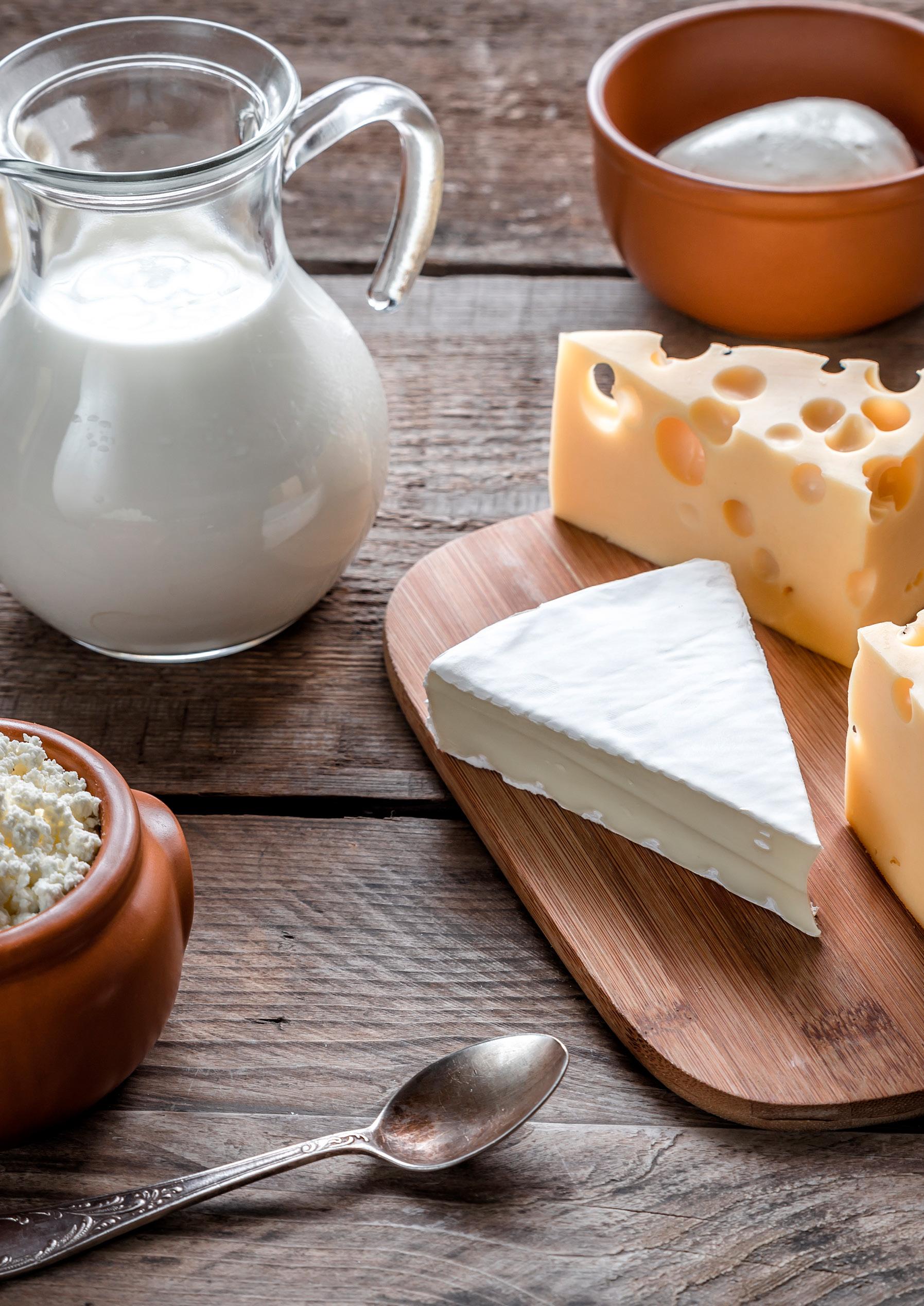



















EDITORIAL
Editor: Kelebogile Nondzaba +27 (0)78 175 9632 kelebogile.nondzaba@newmedia.co.za
Layout & Design: Tumi Kunene
ADVERTISING
Key Account Manager: Càndida Giambò-Kruger +27 (0) 71 438 1918 càndida.giambò-kruger@newmedia.co.za
INTERNATIONAL SALES
Germany/Austria/Switzerland: Eisenacher Medien
Erhardt Eisenacher +49 228 249 9860 info@eisenacher-medien.de Italy: Ngcombroker
Giacomo Rotunno +39 370 101 4694 g.rotunno@ngcombroker.com
Taiwan: Ringier Trade Media
Sydney Lai +886 4 2329 7318 sydneylai@ringier.com.hk
SEPTEMBER - DECEMBER 2025 Vol. 14 • No. 2
Showcasing the latest products on South Africa's shelves NEWS
Coca-Cola beverages Africa
Fachpack 2025
Anuga Dairy 2025
Gum Acacia: From Sahel to your table
Dairy: Innovation and sustainability
Texturising vegan yoghurt alternatives
Next-level performance at Drinktec 2025
Revolutionary puffing technology
Pumping yum into confectionery
Superior natural colour performance
Global food safety standards evolve
Transforming South Africa’s canning industry
Precision motion systems for food processing
CIRCULATION
Circulation Manager: Felicity Garbers felicity.garbers@newmedia.co.za
PUBLISHING TEAM
General Manager: Dev Naidoo
Head of Content & Digital Strategy: Varushka Padayachi
Production Manager: Angela Silver
Group Art Director: David Kyslinger
B2B JOHANNESBURG OFFICE
Building 13, The Woodlands Office Park, 20 Woodlands Drive, Woodmead, Sandton PO Box 784698, Sandton 2146 Tel: +27 11 867 6111
MEDIA24 MEDIA
CEO: Minette Ferreira
CFO: Lana Goliath
MEDIA24 CORPORATE
CEO MEDIA24: Raj Lalbahadur
CFO MEDIA24: Nelmarie Beyers

COMMUNICATE & CONNECT
Welcome to the latest issue of Food Manufacturing Africa, where we explore the dynamic advancements shaping the food and beverage manufacturing industry.
This edition dives into the African dairy sector’s transformative journey, showcasing its adoption of smart technologies and precision fermentation for a sustainable future.
We spotlight the African Union’s efforts to harmonise food safety standards, addressing critical value chain improvements across the continent. As consumer preferences shift, our coverage extends to topics like sugar reduction and the rise of plant-based alternatives in confectionery—offering insights into evolving market demands.
From functional ingredients, like prebiotic GOFOS™ fibre driving nutritional innovation, to sustainable packaging solutions tackling waste and hygiene challenges, this edition is packed with actionable ideas. For those looking to stay informed about global discourse, we take you inside Anuga 2025, a key platform for international industry leaders and innovation.
Whether it’s breakthroughs in processing technology or insights into market trends, this issue reinforces our mission of keeping professionals at the forefront of industry evolution. We hope you enjoy your read and find inspiration to drive your own innovations forward.
Here’s to a future of sustainable growth and creativity in food manufacturing!






Smart and flexible conveying that keeps your line running smoothly. We provide a wide variety of innovative and dependable conveying and product handling systems to move product through the line as efficiently as possible.
Ideal applications:
• Snack foods
• Prepared foods
• French fries
• Fresh produce
• Pet food
• Nuts + Trail Mix
• Crackers
• Confectionery


September 2025
LabelExpo Europe
Barcelona, Spain
16 – 19 September
www.labelexpo-europe.com/
Fachpack
Nuremberg, Germany
23 – 25 September www.fachpack.de/en
World Food Istanbul
Istanbul, Turkey
2-5 September
www.worldfood-istanbul.com


October2025
Pack Expo
Las Vegas, USA
1 October www.packexpolasvegas.com
Anuga Cologne
Germany
4 – 8 October www.anuga.com

November 2025
All4Pack
Paris, France
4 - 7 November
www.news.all4pack.com

Douwe Egberts, one of the world’s most loved coffee brands, has officially launched its D.E. Excellent capsule range in South Africa, marking a significant step as the brand expands into the local singleserve capsule market for the first time. With roots in the global coffee industry dating back to 1753, Douwe Egberts continues to evolve with consumer needs while staying true to its heritage of expertly crafted coffee. As the South African market increasingly embraces at-home café experiences, the introduction of the capsules reflects Douwe Egberts’ commitment to offering South Africans greater variety and convenience without compromising on taste or quality.
South Africa’s coffee market was valued at US $674 million in 2023 and is projected to grow at a compound annual rate of 7.35%, reaching over US $1.1 billion by 2030, with the pods and capsules segment identified as one of the fastest-growing. Recent insights from Statista also show that the overall market is expected to grow by approximately 7.2% annually between 2024 and 2028, largely
driven by a shift toward at-home brewing and demand for premium convenience.
This data highlights a clear and growing consumer preference for high-quality, easy-to-use coffee solutions - precisely the need that Douwe Egberts is addressing with the launch of its D.E. Excellent capsule range in South Africa.
D.E. Excellent Mocca – A bold, intense blend with a slow, dark roast and indulgent chocolate undertones. Rated intensity 9, this capsule is perfect for those who prefer a fullbodied, rich cup of coffee.
D.E. Excellent Gold – Offering a more rounded flavour profile, this capsule delivers a slow roast with sweet, fruity notes, balanced at an intensity level of 7.


Believe it or not, solving life’s challenges and troubles over a cup of tea is far more than an old wife’s tale. Now, there is scientific evidence that this centuries old brew can not only calm you but also help you think more clearly. In fact, your daily cuppa may even keep you mentally young.
MANAGING DAILY STRESS TO A “TEA”
Popular for centuries, tea offers the best of both world’s when it comes to managing the stresses of everyday life – it boosts mental
Coca-Cola Beverages Africa (CCBA) has invested R365m in a new state-of-the-art bottling line capable of producing 72,000 bottles per hour at its plant in Midrand, South Africa.
The high-speed production line marks a South African first, producing Bonaqua Pump Still 750ml and Powerade 500ml packs with an innovative sports bottle cap. Beyond this milestone, the line will also produce Bonaqua Still in 330ml and 500ml packs, further driving the company’s efforts to expand its hydration category. Underscoring a commitment to innovation, the line will additionally produce the recently launched Powerade Springboks Edition.
“By launching this new line, we strengthen our ability to meet growing consumer demand and create shared value across the local value chain, including for our customers and communities,” said Moses

Lubisi, Manufacturing and Technical Director at CocaCola Beverages South Africa (CCBSA), a company in the CCBA group.
“Importantly, this investment reaffirms the Coca-Cola system’s local approach – we produce locally, distribute locally and, where possible, source locally.”
“At CCBA, our passion for refreshing the continent drives everything we do,” said Sunil Gupta, Chief Executive Officer of CCBA. “This new production line in South Africa represents a key step in our ambitious growth plans in all our markets on the continent.

alertness while simultaneously creating a sense of calm.
International tea brand, Dilmah, which recently poured its Exquisitely Flavoured Tea range into the South African market, offering eight delicious new infusions that combine the finest, single-region Ceylon black tea with real fruits, herbs, and spices, is punting the health benefits of this modern-day version of an age-old staple.
The not-so-secret compounds are L-theanine and caffeine which are naturally found in tea (particularly green and black tea).
High performance at a remarkably competitive price–this is what the HERMA eco label applicator will demonstrate for the first time as part of a labelling machine at Fachpack 2025 (Hall 3C, Stand 322). Integrated into the newly designed 652C model, it enables highly efficient top and bottom labelling. Despite its premium equipment, the HERMA eco combines exceptional efficiency with a level of mechanical and build quality rarely seen in this segment. The system will be demonstrated in conjunction with a Köra-Packmat friction feeder, which separates
products before labelling them on both sides. Alternatively, it can be configured to label just one surface. The system’s impressive precision is thanks to the HERMA eco’s master encoder function, which ensures continuous synchronization with the conveyor speed. This delivers accurate labelling—even at up to 30 meters per minute and for labels up to 160 millimeters wide. The 652C is modular and can be tailored to specific needs. Optional integration of the HERMA 500 thermal transfer printer or a hot-foil unit enables variable data printing on both sides. Its modular design also ensures quick delivery times.
Seasoning with precision and minimising waste are top priorities for snack processors. At the same time, keeping up with fast-changing flavour trends and meeting strict food safety standards remain constant challenges in the industry. That’s why Heat and Control developed two breakthrough solutions: the FastBack® Symphony On-Machine Seasoning (OMS) System and the Spray Dynamics® Symphony In-Kitchen Seasoning (IKS) System. Each is purpose-built to simplify seasoning processes and deliver smarter, cleaner results — with greater accuracy, efficiency, and sustainability.
The FastBack® Symphony OMS system was developed in direct response to industry needs (Image 1) — offering integrated ingredient containment and precise seasoning application to help manufacturers overcome challenges with waste, airborne seasoning, and inconsistent coverage. By addressing these key concerns, Symphony OMS supports improved food safety, better working conditions, and boosts overall operational efficiency.
As manufacturers increase seasoning intensity and push application rates from 6% to over 12%, traditional seasoning systems begin to struggle — leading to more airborne dust, uneven coverage, and higher sanitation demands.
The FastBack Symphony OMS system is built to meet this challenge head-on, featuring our most advanced seasoning control yet powered by two patent-pending new technologies:
• Seasoning capture – captures airborne seasoning and redirects it through the product stream
• Seasoning containment – prevents fugitive dust from escaping into the plant environment
A new cyclone-based dust collection system further reduces airborne particles,

improving allergen control, cutting cleaning time, and easing the load on downstream filtration. The result? Better coverage, reduced waste, a safer workspace and seasoning that stays where it belongs — on the chip.
• Seasoning capture technology draws seasoning back through the incoming product stream for maximum chip-tochip coverage
• Seasoning containment technology: no fugitive dust, protects operators, and supports allergen control
• Improved efficiency: achieve up to 30% more seasoning on product.
• Reduced load on dust collection filter: up-to 30% less dust in collectors, no fugitive dust
• Reduced labour and downtime: 50% fewer parts to remove, tool-less operation, less downtime, easier cleaning.
• Lower maintenance: expected life of parts is significantly less and no preventative maintenance is required
Symphony OMS represents a major advancement in on-machine seasoning, integrating precision engineering and enhanced dust control to address the performance demands of high-speed snack production. Its design supports consistent, accurate seasoning even at elevated application rates and line speeds.
While on-machine seasoning handles high-volume demands, in-kitchen seasoning presents its own unique set of challenges. Operators must manage complex flavours, allergens, hygiene standards, and labour shortages — all while improving efficiency. Heat and Control recognises that in-kitchen seasoning is about more than just flavour application. It also needs to reduce waste,
enhance hygiene, and simplify daily operations. That’s why we developed the Spray Dynamics® Symphony In-Kitchen Seasoning (IKS) System.
At the core of this system is patent-pending seasoning capture technology, which draws airborne particles back through the product stream, capturing seasoning where it matters most — on the product. The result is better coverage, less waste, and a cleaner, safer working environment.
• More accurate seasoning – integrated load cells and proprietary controls deliver consistent, repeatable results
• Even distribution, no build-Up – FastBall applicator improves coverage and reduces cleaning time
• Fewer parts, less downtime – frameless drum design means faster maintenance and sanitation
• Cleaner working environment – no fugitive dust. Better allergen control and operator comfort
• Lower costs over time – Reduced labour, fewer parts, and better performance add up to long-term savings
Developed in response to the growing complexity of in-kitchen operations, Symphony IKS (image 2) helps processors achieve consistent results with less waste and effort. More than an upgrade, Symphony IKS is a practical solution for improving seasoning performance in compact, high-demand environments.
With the launch of these new technologies, Heat and Control is raising the benchmark for cleaner, safer, and more efficient seasoning operations. Whether you’re running high-volume production lines or flexible in-kitchen systems, these solutions support precision, performance, and hygiene — at every scale.

Heat and Control –www.heatandcontrol.com
The dairy industry is undergoing a natural revolution. Evolving consumer preferences are driving the ascent of plant-based additives, led by Gum Acacia from the Sahel region to your local store.
Customers place a high value on natural formulations because it has several advantages, and transparency on the ingredients in the food and beverages that consumers buy. The modern-day consumer wants to make the best choices for their health and the environment, they are doing more research on the products they purchase and consume. They want to know every aspect of the product, including the packaging, raw ingredients and resources utilised during production.. This compels manufacturers to use plant-based alternatives such as raw ingredients. A plantbased ingredient such as Gum Acacia is used as an alternative additive in dairy products.
Acacia trees have been found in numerous studies to have a very favourable effect on the environment. These trees function as a natural barrier to sand, they also stop desertification, preserve the land and in essence - working to eradicate the growing deforestation issue in the region. Over the years, Alland & Robert, one of the global leaders in Gum Acacia manufacturing has built up a unique network of reliable, competent suppliers throughout the Sahel, also known as the “Gum Belt” region to bring innovative plant-based solutions to texturing, stabilising and thickening improvements. With strong ties to local communities, their goal is to support its network of suppliers while improving production lines to develop the best quality of products.
Gum acacia, also known as Acacia gum, Gum Arabic or Acacia Fiber, referred to as E414 in the food sector, is sourced from the Acacia tree in the Sahel Region of Africa. The harvest for this ingredient is 100% natural. No chemicals are involved in the harvesting process, which is carried out completely by hand. The process of harvesting Gum acacia involves an incision made to the tree in order to release a thick, amber-coloured sap, which is then carefully gathered, cleaned, then dried and processed to make different forms appropriate for diverse uses.

"Gum acacia, also known as Acacia gum, Gum Arabic or Acacia Fiber, referred to as E414 in the food sector, is sourced from the Acacia tree in the Sahel Region of Africa. "
For African inhabitants, natural gums are a major resource because they contribute significantly to small-scale farmers' annual profits through their yield, essentially supporting their livelihoods and economic development of the region. In some countries in the Gum Belt, Alland & Robert pays for harvests in advance in order to help farmers invest in new material and equipment, helping suppliers thrive. Alland & Robert also provides suppliers with maintenance, logistics material, laboratory technology and training support.
Bragan Ingredients, a Solevo Group company since October 2024, has earned generations of trust as a leading supplier and distributor of raw materials and ingredients across South Africa and sub-Saharan Africa. Serving the food, beverage, bakery, dairy,
pharmaceutical, and cosmetic sectors - as well as industrial and agricultural marketsBragan offers an extensive portfolio to meet the evolving needs of its customers.
With ISO 9001:2015-certified warehousing and distribution hubs in Johannesburg, Cape Town, Durban, and Port Elizabeth, we provide national reach with uncompromising quality. Now powered by Solevo Life Sciences and strengthened by Solevo’s global network, Bragan Ingredients delivers nutrition, safety, and innovation to Africa’s growing industries. From our South African roots to Solevo’s continental platform, we remain committed to shaping a safer, healthier, and more sustainable future for communities across the region.



Bragan: www.braganingredients.co.za
Alland & Robert: www.allandetrobert.com email: enquiries@braganingredients.co.za call: +2711 708 0007
Africa’s dairy sector embraces smart technology and precision fermentation whilst addressing infrastructure challenges and regulatory harmonisation across the continent.
The African dairy industry stands at a crucial crossroads, where traditional farming practices meet cutting-edge technology. Across the continent, dairy producers are embracing smart farming innovations to overcome longstanding challenges whilst positioning themselves for sustainable growth in an increasingly competitive global market.
In South Africa, the dairy sector demonstrates remarkable resilience despite significant structural changes. Over 60% of farms now utilise smart irrigation management systems, satellite-based crop monitoring, and AI-driven farm advisories that provide personalised management recommendations. These technological advances are proving essential as the industry consolidates around fewer but larger operations leveraging economies of scale.
The international dairy processing sector is experiencing revolutionary changes through advanced membrane filtration technologies, precision fermentation, and non-thermal pasteurisation methods. These innovations preserve nutritional and sensory qualities whilst improving product safety and shelf life.
Membrane filtration technologies— including microfiltration, ultrafiltration, and nanofiltration—enable selective separation of milk components without heat exposure, preserving proteins and nutrients whilst improving yield. These methods support sustainability goals by reducing energy consumption, chemical usage, and waste generation.
Precision fermentation represents perhaps the most significant breakthrough, enabling the creation of dairy-identical proteins without traditional animal agriculture. This biotechnology approach supports hybrid products that blend conventional and plant-based proteins, addressing both environmental concerns and changing consumer preferences.
Despite technological advances, regulatory

“The African dairy industry stands at a crucial crossroads, where traditional farming practices meet cutting-edge technology.”
frameworks across Southern African Development Community (SADC) countries remain fragmented, creating barriers to regional trade and quality standardisation. Many African dairy producers struggle with inconsistent enforcement of milk quality standards, particularly in informal markets that dominate the sector.
The dominance of smallholder farmers— who often lack access to finance, training, and modern technology—complicates regulatory compliance. Poor rural infrastructure, including inadequate cold chain facilities and limited electricity access, leads to high spoilage rates and reduced milk quality.
Environmental considerations increasingly drive innovation priorities across the global dairy industry. In South Africa, sustainability reports highlight focus on greenhouse gas emissions reduction, soil health maintenance, and optimised nutrient management practices.
The rise of plant-based alternatives
reflects these environmental concerns, with oat, almond, and pea-based products gaining significant market share. Major dairy companies are adapting production lines to accommodate these alternatives, recognising the 71% of consumers who view plant-based options as healthier choices.
Advanced packaging innovations, including biodegradable cartons with QR code traceability, enhance transparency regarding product origin and sustainability credentials. These developments support consumer demands for environmental responsibility whilst maintaining product integrity.
South Africa’s dairy industry has regained its position as a net exporter after nearly a decade, with China representing a particularly promising market expecting a 10% boost in imports from South African producers. This export growth occurs alongside domestic demand increases, supporting the industry’s modest but optimistic growth projections.
Commercial herds, consisting mainly of Holstein and Jersey breeds, continue adapting through strategic breed selection and precision farming techniques. AI-powered sensors monitor animal health, automated milking systems optimise productivity, and data analytics enable personalised feeding regimens that can increase milk yields by up to 20% across regional markets.

www.safoodreview.co.za


From raw milk to finished dairy products – test the full range along the production chain with just one easy-to-use FT-NIR analyzer:
Raw Milk & standardisized Milk
Cream & condensed Milk
Yoghurts & Desserts
Milk- & Whey Powder
Lactose- & Protein Concentrates
Hard- & Soft Cheese
...and more!
Ready-to-use calibrations provide a quick start into routine analysis.
For further information visit: www.bruker.com/dairy-analyzer
Bruker South Africa (Pty) Ltd
Phone: +27 10 442 1999
Email: info.za@bruker.com

Anuga Dairy 2025 brings together 470 top global exhibitors, showcasing innovation, sustainability, and health-driven dairy trends in Cologne this October.
470 exhibitors from the dairy industry. Full halls thanks to sustained demand.
From Bayernland to Velder: Top international brands with new products in Cologne. Anuga Dairy 2025 presents industry trends and future perspectives. In total, 470 exhibitors from the international dairy industry will be represented at Anuga Dairy this year - one of the ten trade shows of Anuga in Cologne. The unique combination between traditional companies and exciting newcomers impressively underscores its significance as a must-attend event for the industry. The renowned exhibitors that will be showcasing their latest products and innovations include prestigious companies such as Bayernland, DMK, Emmi, Fayrefield, Garmo, Granarolo, INALPI, Vandersterre, Yayla and Zanetti. This top-class field of participants will be complemented by the newcomers Bergader and Velder, which enrich Anuga Dairy's wide-ranging portfolio. Exhibitor groups from Germany, France, Greece, Great Britain, Ireland, Italy, the Netherlands, Austria, Poland, Switzerland, Spain and Turkey will present their national specialities. As such, the trade show is not only accentuating its broad international alignment, but also the strong representation of the global dairy markets.

“Food trends like sustainability, customisation, and innovation are redefining the future of meals and beverages worldwide—stay ahead of the curve.”
Anuga Dairy 2025 is dedicated to innovation, sustainability and health-oriented product concepts. The spectrum of products presented ranges from milk and plant-based beverages, to cheese, yoghurt and butter, through to vegan alternatives – and thus reflects the growing global demand for high-quality, sustainable foods. Topics like environmental-friendliness and functional added value offers characterise both the product innovations as well as the expert discussions. Particularly the market for functional and health products continues to grow rapidly worldwide: Above all, products containing postbiotics and prebiotics that stimulate intestinal health, like yoghurts with special health-promoting characteristics, are especially popular.
According to Anuga's knowledge partner, Innova Market Insights, consumers are increasingly following the trend towards natural diets, sustainability and health prevention. In this way, in 2024 around 52% preferred yoghurts with additional health benefits. Cheese products with 'declared protein content' and 'no additives' have also been experiencing double-digit growth rates for years.
Anuga Dairy 2025 continues to record strong demand and impressively high registration figures. Due to the already optimally exploited hall capacities, the event will maintain its established level regarding the number of exhibitors and exhibition space. Nevertheless, its reach and importance remain undisputed – not least thanks to the impressive international group stands. Anuga Dairy as an indispensable meeting point for experts, manufacturers and retailers, remains to be the centrepiece of Anuga. It not only offers a wealth of new products, it also serves as a platform for exchange about market opportunities, challenges and the development of sustainable business relationships. Anuga will take place from 4 to 8 October 2025 and unites 10 trade shows under one roof. Further information can be found at: www.anuga.com.

Anuga Select India - Uniting Innovation, Collaboration, and Growth in the Global F&B Landscape, Mumbai 20.08. - 22.08.2025
ISM Middle East - The Heart of Sweets and Snacks in the Middle East, Dubai 15.09. - 17.09.2025
Anuga - The leading trade fair for the global food industry, Cologne 04.10.08.10.2025

Herbafood's citrus fibre and pectin combination deliver smooth, creamy textures in plant-based yoghurt alternatives, transforming vegan dairy products.
Yoghurt alternative products based on vegetable sources are gaining market share and gaining increasingly popular for the consumer. One important aspect is a perfectly stabilised texture – similar to dairy products – to reach a balanced indulgence. To achieve a smooth texture and full enjoyment, Herbafood recommends using a combination of vegetable protein sources and highfunctional citrus fibre Herbacel® AQ® Plus Citrus.
The combination of citrus fibre and pectin is also ideal for making the perfect fruit topping for vegan desserts. Thanks to its special properties, the functional citrus fibre leads to reduced post-gelation in the fruit level and offers constant flow properties owing to its temperature-independence. The combined use pectin and citrus fibre also enables optimised control of syneresis.
For fruit preparations with lower sugar content of 20 – 40 °Brix, the natural texture principle from the fruit is also recommended: Citrus fibre and pectin. This combination meets the rheological requirements for yoghurt fruit preparation. They do not mask the flavours and therefore offer unadulterated fruit enjoyment with the best flavour release. The citrus fibre gives the fruit preparation the body needed at this dry mass level. The pectin ensures the smooth, homogeneous texture, surface gloss and optimal flavour release. The addition of calcium salt is not necessary here either. As with pectin alone, ingredient labelling is short, simple and easy to understand.

“Yoghurt alternative products based on vegetable sources are gaining market share and become increasingly popular for the consumer.”
Cream cheese preparations and their vegan alternatives with a particularly creamy, smooth and full-bodied texture are very popular with consumers. The challenge here is to maintain the desired flavour and above all the texture, especially if the fat content is reduced and the water content increased. A combination of functional citrus fibre and pectin achieves a particularly creamy, smooth and full-bodied texture in cream cheese preparations.
Yoghurt alternative products based on vegetable sources are gaining market share and becoming increasingly popular for the consumer. One important aspect is a perfectly stabilised texture to reach a balanced indulgence. To achieve a smooth texture and full enjoyment, Herbafood recommends using a combination of vegetable protein sources and highfunctional citrus fibre Herbacel AQ Plus Citrus.

• Adjustment of texture and mouthfeel
• No influence on fermentation process
• Thickening
• Balanced mouthfeel
• Fat mimic
• Calcium enrichment possible
• Process stable & easy handling.
The utilisation of food ingredients is predicated upon their capacity to meet the following criteria: HERBAFOOD‘s functional citrus and apple fibres allow for precise control of functional properties through effective water binding, stabilisation, or emulsification. Functional fibres have been shown to improve flavour release. Due to its high-water retention and excellent flavour release properties, a reformulation of products to contain less salt, fat, or sugar is possible.
HERBAFOOD INGREDIENTS is a pioneer in the field of multifunctional ingredients for the food industry, and offers an extensive range of functional dietary fibres made from fruit and vegetable fibres. We achieve the holistic utilisation of our raw materials in our value chain as an ecologically prudent upcycling process. Our team guarantees optimal application service for individual requirements of the food industry.
Fine Chemicals are the local distributors of Herbafood in South Africa.
By combining plant-based protein sources with a combination of H&F pectin and citrus fibres, innovative yoghurt alternatives can be produced from different raw material source.

Savannah Fine Chemicals –www.savannah.co.za
Herbafood - www.herbafood.com
for texturizing yogurt alternatives
Yogurt alternative products based on vegetable sources are gaining market share and become increasingly popular for the consumer. One im portant aspect is a perfectly stabilized texture in order to reach a bal anced indulgence.
To achieve a smooth texture and full enjoyment, Herbafood recommends us ing a combination of vegetable protein sources and high-functional citrus fiber Herbacel ® AQ ® Plus Citrus.

Functional citrus fiber
Herbacel® AQ® Plus Citrus
• Adjustment of texture and mouthfeel
• No influence on fermentation process
• Thickening
• Balanced mouthfeel
• Fat mimic
• Calcium enrichment possible
• Process stable & easy handling
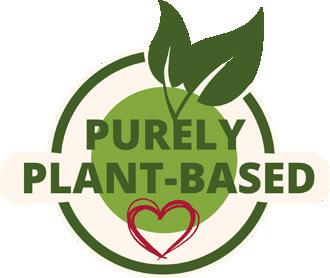



At drinktec 2025, Sidel will inspire manufacturers to master production performance through innovation, expertise and partnership.
“The future of the packaging industry is the ability to master the total line performance. To achieve this, Sidel partners with food and beverage manufacturers to lead the way in sustainable packaging, to elevate productivity, and to maximise performance for the lifetime of their lines,” said Pietro Cassani, President & CEO, Sidel
Sidel, a global leader in packaging solutions, invites customers to meet its experts at drinktec 2025, Hall A6, Booth 361, September 15-19 at the Munich Trade Fair Centre. In a world-exclusive, Sidel has chosen drinktec to launch its era-defining new technology.
Sidel visitors will be guided through an interactive tour to experience an optimised packaging line journey. Along the way, they’ll have the chance to see and touch Sidel’s latest technology to unlock a new level of performance and sustainability, starting from the package’s materials including 100% recycled PET solutions, to a new level in line efficiency, to sustained and elevated line performance across the lifecycle.
At the heart of Sidel’s booth, visitors will be able to discover levels of production & packaging performance previously thought of as unachievable. “We’re pushing boundaries and achieving more with less - one of the key principles behind our latest line innovations,”
Sidel is a global provider of packaging for beverage, food, home and personal care products in PET, can, glass and other materials. Based on over 175 years of proven experience, we help shape the factory of tomorrow, through advanced systems and services, line engineering, eco-solutions, and other innovations.
With over 40, 000 machines installed in more than 170 countries, Sidel has five thousand plus employees worldwide who are passionate about providing equipment and service solutions that fulfil customer needs.
We continuously ensure we understand the evolving business and market challenges our customers face and commit to meeting their unique performance and sustainability goals. As a partner, we apply our solid technical knowledge, packaging expertise and smart data analytics to assure lifetime productivity at its full potential.
adds Cassani.
Sidel’s stand will be easily identifiable as it features an orange-coloured monolith and angled shape. This signature mark next to the company’s logo represents the ‘angle of performance’, a forward-looking approach to improving performance for our customers, grounded in a rich history of food & beverage solution expertise.
Picturing nature’s four elements, or four sources of power and creation, Sidel is set to introduce a groundbreaking ‘fifth element’ for the packaging industry. To be unveiled at the

“Sidel has chosen drinktec to launch its era-defining new technology.”
show, this new element empowers a new level of performance, where even the impossible becomes possible, with a paradigm shift in lightweighting, efficiency, ease …and more! Find out more about Sidel at drinktec and how you can access this kind of support for your business on the Sidel website.
We believe in a world where packaged goods are safe, accessible, and enjoyable. We believe we have a responsibility to protect the planet and its people in all we do. That is why for over 170 years, we have been innovating and partnering with producers to deliver high-performing packaging solutions in the beverage, food and home and personal
care markets. We take pride knowing that every day, people all over the world consume products packaged by our solutions. Solutions that are developed to the highest quality and performance standards, and with a passion for partnering with customers to empower their goals for generations to come. Our vision is clear: We shape the future of the packaging industry by providing our customers with highperformance solutions for product protection, desirability, availability and sustainability.
At Sidel’s reach is a community of extensive experts. A member of Tetra Laval Group, together with Tetra Pak and DeLaval, Sidel Group is itself made up of 3 entities: Sidel, Gentlebrand, and Makro Labelling. Together, and through additional partnerships, we are positioned among an extensive global network to meet your packaging needs.
Sidel – www.sidel.com



Bühler's acquisition of CEREX puffing technology delivers 50% energy savings whilst expanding applications across cereals, snacks, and dairy products globally.

Bühler has acquired cutting-edge puffing technology from CEREX for food, pet food, and feed applications.
This strategic acquisition expands Bühler’s product portfolio, offering advanced solutions to meet the growing global demand for healthier, more diverse food products.
The puffing technology offers remarkable versatility and can be applied to a wide range of items, including snacks, ready-toeat breakfast cereals, confectionery, dairy products, and bakery goods, providing manufacturers with greater flexibility and innovation potential. “The puffing process is a game-changer in how we approach cereal and snack production, offering a broad range of recipe possibilities, including coatings and fillers across many product categories,” said Christoph Vogel, head of business unit human nutrition at Bühler.
“The integration of this technology into Bühler’s
“The integration of this technology into Bühler's portfolio strengthens our ability to meet the evolving needs of our customers and fosters continued innovation in recipe development."
portfolio strengthens our ability to meet the evolving needs of our customers and fosters continued innovation in recipe development.”

The puffing technology significantly improves grain processing by achieving yields exceeding 95 percent, minimising waste, and ensuring uniform puffing
Bühler is driven by its purpose of creating innovations for a better world, balancing the needs of economy, humanity, and nature in all its decision-making processes. Billions of people come into contact with Bühler technologies as they cover their basic needs for food and mobility every day. Two billion people each day enjoy foods produced on Bühler equipment; and one billion people travel in vehicles manufactured using parts produced with Bühler solutions. Countless people wear eyeglasses, use smart phones, and read newspapers and magazines – all of which depend on Bühler process technologies and solutions. Having this global relevance, Bühler is in a unique position to turn today’s global challenges into sustainable business.
As a technology partner for the food, feed, and mobility industries, Bühler has committed to having solutions ready to multiply by 2025 that reduce energy, waste, and water by 50% in the value chains of its customers. It also proactively collaborates with suppliers to reduce climate impacts throughout the value chain. In its own operations, Bühler has developed a pathway to achieve a 60% reduction of greenhouse gas emissions by 2030 (Greenhouse Gas Protocol Scopes 1 & 2, against a 2019 baseline).
Bühler spends up to 5% of turnover on research and development annually to improve both the commercial and sustainability performance of its solutions, products, and services. In 2024, some 12,350 employees generated a turnover of CHF 3.0 billion. As a Swiss familyowned company with a history spanning 165 years, Bühler is active in over 140 countries around the world and operates a global network of 105 service stations, 31 manufacturing sites, and research and training centers in 26 locations.

quality across all grains. The system is designed for exceptional energy efficiency, consuming 50 percent less power compared to conventional alternatives — operating at just 60 kilowatt-hours (kWh) per 100 kilograms of product, instead of the typical 120 kWh. Along with its sustainability benefits, the technology delivers a consistent, industrial grade puffing process that complies with the highest global food safety standards.
Puffed products are viewed as a natural option with no added ingredients and are available as white-label options. This technology can be used in a variety of
products. In breakfast cereals, grains like rice, corn, wheat, or quinoa are puffed to create expanded, crunchy textures that are perfect for morning meals. In cereal bars, puffed grains add texture, visual appeal, and a distinctive crunch. The grains are either mixed with melted chocolate or layered on top, depending on the desired structure of the final product, providing a balance of crunch and lightness. Puffing technology is also used in dairy products, such as yogurt and ice cream, where puffed grains like quinoa, rice, or buckwheat serve as crunchy toppings or mix-ins to enhance the eating experience and nutritional value.
To help customers leverage the full potential of this technology, Bühler launched its new Puffing Application Center in Uzwil in June 2025—a platform for innovation, testing, and product development. Here, customers can experiment with new recipes using pulses and grains, develop tailored processes, and gain hands-on experience with the new puffing technology. “With Bühler’s technical expertise and advanced equipment, customers can fine-tune recipes and validate product performance at scale, all without the need to invest in their own R&D infrastructure,” says Carol Krech, Head of Market Segment Cereals & Snacks at Bühler. For more information, visit the Puffing Application Center website.

Bühler - www.buhlergroup.com

Unlock creativity, expand possibilities. Explore our new puffing technology.
the
Transform wheat, rice, oats, quinoa, corn, and spelt into nutritious, light, and digestible puffed ingredients. Our advanced puffing technology expands grains up to 12 times their original size and offers up to 95% yields. It is the perfect solution for enhancing cereals, snack bars, chocolate bars, yogurts, ice creams, and for creating innovative toppings and inclusions.
Ready to explore the future of puffing? Scan the QR Code to discover more:

Eddie Le Roux, Hygienic Pump Specialist at Verder Pumps South Africa, explores how specialised pumping solutions drive modern confectionery manufacturing innovation and efficiency.
Though inflation and interest rates have affected consumer spending power in South Africa, contributing to minimal growth in the confectionery market of late, the industry is expected to see improvement between 2025 and 2030. From chocolate and sugar confectionery to ice cream, pastries and cakes, the market’s growth is being driven by the convenience of online shopping, the introduction of healthier options, and a wider variety of products. Revenue in South Africa’s confectionery
“The surge in veganism has prompted the development of plantbased confections.”
market is expected to amount to USD5.09 billion in 2025, and anticipated to grow annually by 6.96% (CAGR 2025-2030), according to Statista.
This aligns with global trends, where health consciousness and veganism, as well
as sustainability trends, are driving both change and worldwide growth at 5.40% annually (2024-2029). As consumers locally and abroad increasingly demand healthier and more sustainable options, candy and confectionery manufacturers must adapt and innovate. Current production trends focus on reducing sugar content, embracing vegan ingredients, and minimising energy consumption — each reflecting broader societal shifts towards health and environmental consciousness.

Reducing sugar challenges manufacturers have to alter traditional recipes without compromising taste and texture. The surge in veganism has prompted the development of plant-based confections - free from animalderived ingredients – to cater to a rapidly expanding market segment. Intensified focus on sustainability, demands that confectionery manufacturers relook their supply chains as well as intensify efforts to decrease energy usage in production processes, thereby reducing carbon footprints and operational costs.
In this evolving context, the role of specialised equipment, such as pumps, becomes crucial. Efficient and versatile pumping solutions are essential to meet the stringent demands of modern candy production. They must handle a variety of ingredients – ranging from high-viscosity syrups
to delicate flavouring – while operating under the principles of energy efficiency and process optimisation.
Lobe pumps, for example, are an integral part of the hygienic production processes in the confectionery industry, not only because of their ability to pump viscous products but also due to their outstanding performance under various operational conditions. These pumps are particularly suited for applications that require high temperatures, such as processing melted chocolate (< 100 degrees) or sugar masses (>100 degrees), maintaining efficiency and reliability.

Moreover, lobe pumps offer excellent Net Positive Suction Head required (NPSHr), enabling their use in vacuum applications – which is a requirement in confectionery manufacturing for specific process steps. Similarly, twin screw pumps should be considered, since they offer
low-shear capabilities and are able to gently handle delicate products, preventing damage to ingredients such as nuts and fruits. They can handle a wide range of viscosities, from thin syrups to thick pastes and they ensure a consistent flow of product which is crucial for maintaining quality and uniformity in confectionery production. Twin screw pumps can handle both low and high pressures efficiently, making them suitable for transferring and processing various confectionery materials and they are designed with the highest hygiene standards in mind - they can be easily cleaned and sterilised in place, reducing downtime and maintaining product safety.
To be assured of the quality of equipment, candy and confectionery processors should look to a trusted and reputable brand that can offer the optimal balance between performance, reliability and costs and help them achieve the sweet spot in their manufacturing process.

Verder Pumps South Africa –
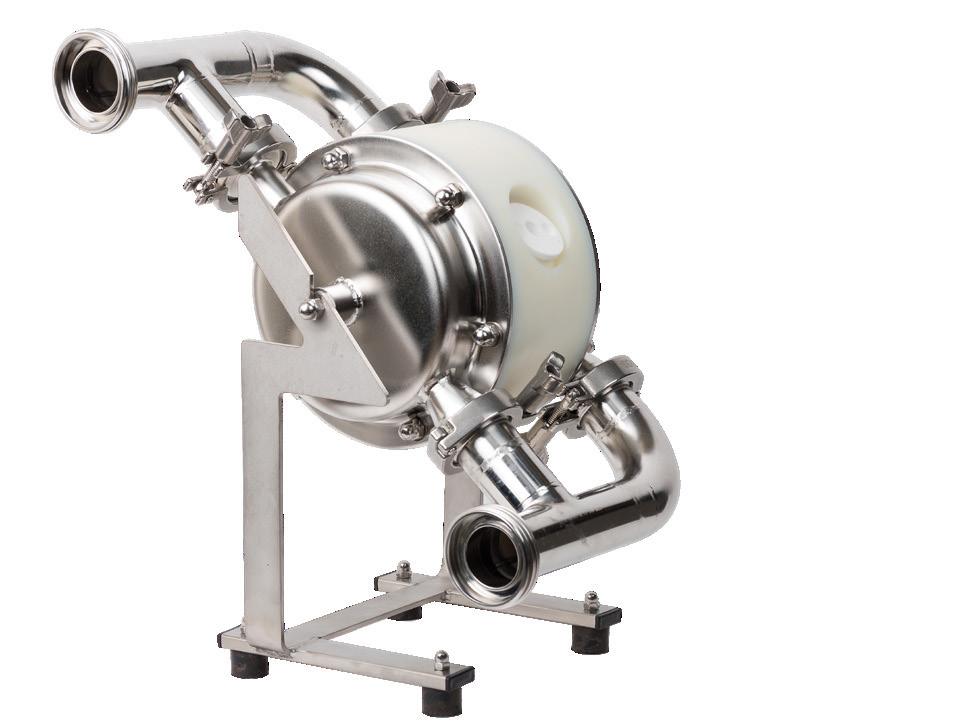


African Union's Continental Food Safety Agency addresses foodborne illness whilst Sabinsa pioneers clean label standards through sustainable sourcing and rigorous testing.

The food safety landscape is evolving rapidly as governments, industries, and consumers around the world become increasingly aware of the direct impact of foodborne illnesses, contamination, and poor hygiene practices on public health and economic development. Across the globe and particularly in developing regions, efforts are being made to harmonise food safety regulations, improve quality control infrastructure, and encourage transparent, ethical practices in food and ingredient production.
In Africa, the African Union (AU) has launched the Continental Food Safety Agency - a groundbreaking initiative to tackle the continent's disproportionately high burden of foodborne illness. Unsafe food is estimated to cause more than 91 million illnesses and 137,000 deaths annually in Africa, primarily due to contaminants such as microbial pathogens, pesticide residues, and mycotoxins¹.
The agency aims to harmonise food safety policies among member states, promote collaboration in surveillance and risk assessment, and strengthen capacitybuilding across national regulatory systems. This initiative marks a significant milestone
in global efforts to ensure safer food systems through public-private collaboration and scientific rigor.
Globally, alongside regulatory improvements, there is a noticeable shift in consumer behaviour toward clean and green label products. This movement is a lasting evolution in how food, supplements, and cosmetics are evaluated. A clean label refers to products made with natural, simple, and recognisable ingredients, free from harmful additives, preservatives, synthetic chemicals, and GMOs. Green labels, on the other hand, prioritise environmentally responsible sourcing, sustainable manufacturing, and ethical practices throughout the supply chain. Consumers now expect not just efficacy and quality, but also transparency and sustainability from the brands they trust.
Sabinsa is a leader in the nutraceuticals, cosmeceuticals, and functional ingredient sectors. Founded in 1991 by the late Dr. Muhammed Majeed, an internationally recognised scientist and entrepreneur in evidence-based medicine, Sabinsa has built a global reputation for blending traditional botanical knowledge with modern scientific
validation, leading the way in this global transformation. At the heart of Sabinsa's success lies its unwavering commitment to food safety, quality assurance, clean label integrity, and sustainability.
Sabinsa follows a comprehensive and multilayered quality control process, ensuring that its products meet international standards. Sabinsa's advanced facility is equipped with sophisticated instrumentation capable of detecting chemical residues, contaminants, and adulterants at trace levels. Sabinsa employs rigorous testing protocols for both raw materials and finished products. These include:
• Contaminant screening for heavy metals, residual solvents, and pesticide residues
• Stability studies and shelf-life determination
• Bio-active content (assay/purity)
• Method development and validation to ensure reproducibility.
Sabinsa plays a critical role in maintaining batch-to-batch consistency, a vital component of food and ingredient safety, especially when working with natural extracts that can vary due to environmental and agricultural factors.










Safety and hygiene in food production begin with responsible raw material sourcing. Sabinsa has made strategic investments in contract farming across over 20,000 acres, partnering directly with farmers to cultivate high-quality botanicals using sustainable and environmentally responsible methods. This not only ensures traceability and ingredient integrity but also minimises the risk of contamination at the source. Such partnerships are governed by strict guidelines related to agronomic practices, soil health, pesticide use, and postharvest handling - all of which contribute to minimising potential food safety hazards. Sabinsa has taken another step in protecting the purity of the curcumin supply chain with the addition of a conclusive test to guarantee that the range of Curcumin C3 Complex® products are all of natural origin. This initiative, which includes radiocarbon testing to detect synthetic adulteration, directly supports:
• Supply chain transparency
• Product authenticity
• Food hygiene and safety standards. Recognition for sustainability and industry leadership: Sabinsa's sustainability and conservation efforts have been widely recognised within the industry. In 2018, the company's Pterocarpus marsupium reforestation project received the NutraIngredients-USA Editor's Award for Industry Initiative of the Year. This visionary
project was both conceived to preserve and propagate this valuable, endangered medicinal tree.
In a significant advancement in the area of feed safety, one of the Sabinsa's facilities in Karnataka, India, earned the prestigious FAMI-QS certification - a global benchmark for the production and trading of specialty feed ingredients and their mixtures. This certification reflects the implementation of a robust Feed Safety and Quality Management System in line with the FAMI-QS Code Version 6.0. Issued by IRCLASS Systems and Solutions Private Limited (IRQS), the certification underscores Sabinsa's dedication to product safety, process control, and global compliance in the animal nutrition sector. From sourcing to final testing, every stage of production at the facility adheres to strict safety and hygiene protocols. This achievement positions Sabinsa among global companies with demonstrable excellence in feed safety, transparency, and sustainability. Sabinsa – www.sabinsa.co.za
“Sabinsa’s unwavering commitment to safety, quality, and sustainability has set a new benchmark in food and ingredient production.”
Sabinsa's global operations are a testament to its unwavering commitment to international regulatory compliance and high standards of hygiene. Operating eight state-of-the-art manufacturing facilities across India and the United States, the company ensures that every site upholds rigorous quality and safety benchmarks. Sabinsa holds several prestigious certifications, including FSSC 22000 for Food Safety Management, FSSAI compliance, and NSF-GMP certification. These certifications not only highlight Sabinsa's dedication to consumer safety and ethical manufacturing but also reinforce our reputation as a responsible global leader. By integrating globally recognized best practices into its local operations, Sabinsa ensures that the products consistently meet the highest standards of quality and hygiene, regardless of the market we serve.
Through unwavering dedication to scientific integrity, sustainable practices, and stringent safety standards, Sabinsa continues to set a global benchmark in food safety, hygiene, and quality assurancechampioning a healthier, safer future for consumers worldwide.
Reference: Website:https:// foodsafety4africa.eu/transforming-foodsafety-in-africa-the-knowledge-platform/. Accessed on 24th July 2025.







CJP Chemicals, the local supplier of Vivapigments in South Africa, offers vibrant solutions for addressing challenges related to natural colours in fat-based mediums.
With the bakery industry’s shift towards more natural and health-conscious ingredients, Vivapigments is at the forefront, offering natural colour pigments developed by CAPOL. These pigments are increasingly used in the bakery sector to enhance both visual appeal and align with consumer preferences for clean label products.
Vivapigments highlights the importance of vibrancy, colour stability, and ease of use in naturally colouring compound coatings, frostings, or fillings. Traditional natural colours often face challenges such as hues turning grey, speckling, and fading. Additionally, demanding environments like high-water activity or fluctuating pH levels can lead to unwanted colour bleeding, diminishing product appeal over time.
Vivapigments offers a complete line of bright natural colour pigments, perfectly designed for fat-based media. Utilising patented microencapsulation technology with rice protein,
Ideal for bakery and chocolate applications, Vivapigments dissolve only in sugar and fat/oil, not water.
“The encapsulation process used in producing Vivapigments offers more protection from light and heat than natural extracts.”
these pigments exhibit properties akin to lake pigments while remaining entirely natural. Their encapsulation ensures outstanding colour stability by reducing the risk of colour bleed and fading from light exposure. The unique particle shape presents easily dispersible powder and liquid solutions, consistently delivering a vibrant, homogenous colouring result.
Natural Colour Extracts: Vivapigments utilises colours derived from natural sources like turmeric, beetroot, and safflower. For example, turmeric imparts a yellow hue, beetroot provides red, and the recently introduced safflower-based yellow meets European Union regulatory standards for food colouring. These colours find applications in various bakery products, such as cakes, bread, and cookies.
Clean Label Alignment: With a growing consumer focus on transparency and ingredient origins, Vivapigments supports the clean label movement. The natural colours enhance visual appeal while satisfying health-conscious consumers’ preferences. Various Applications: Vivapigments’ adaptability allows them to be used across diverse bakery products.
The encapsulation technique mitigates colour bleeding and fading risks, guaranteeing long-lasting vibrancy.
Encapsulation mitigates risk of colour bleeding & fading






Your first choice for speciality ingredients







CJP Chemicals is a proud supplier of Vivapigments® naturally sourced microencapsulated pigments





Natural
Kosher
Halal
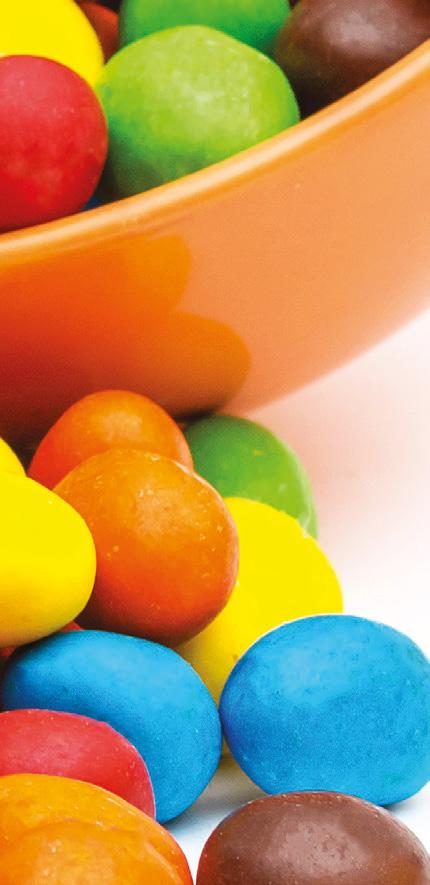

Vegetarian
Vegan
Allergen-free

Aluminium-free
GMO-free

Complete line of bright natural pigments easily dispersible in fatbased or sugar-based solutions.
VEGA's hygienic measurement technology ensures precision and safety in laboratory-scale food processing, supporting innovation from concept to commercial production.
Food processing is no longer just about large-scale production lines and highspeed machinery. In an age where innovation is celebrated, many of the most exciting advancements in food and beverage manufacturing start small, often within laboratory settings, created by culinary scientists. These controlled environments are the birthplace of new recipes, functional ingredients, and process improvements that eventually shape what lands on our shelves and in our homes. At this critical stage of development, hygiene, precision, and product integrity are non-negotiable, and this is where VEGA’s measurement technology shines.
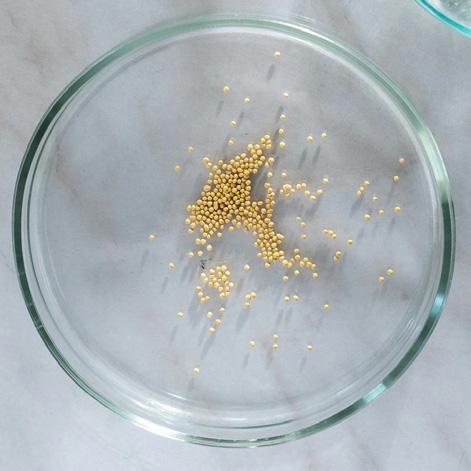
Laboratory-scale food processing plays a central role in R&D for the food and beverage industry. It allows researchers to test new formulations, refine preservation techniques, develop sustainable packaging processes and simulate industrial conditions, all within a controlled, small-batch environment. The insights gained from lab trials inform key decisions before moving to pilot or full-scale production. This makes accurate and hygienic monitoring of every step essential, not only to ensure safety and compliance, but also to guarantee that product characteristics remain consistent when scaled.
Food safety begins with cleanliness, and in laboratory settings where test batches can be as small as a few litres, even microscopic contamination can have serious consequences. Sensors and instrumentation used in this environment are required to meet strict hygienic standards and be designed for CIP (clean-in-place) and SIP (sterilise-in-place) procedures. VEGA’s sensor technology is built with this in mind.
For example, the VEGABAR pressure transmitter series features flush-mounted diaphragms that eliminate crevices where product residues could accumulate. These transmitters are made from food-grade
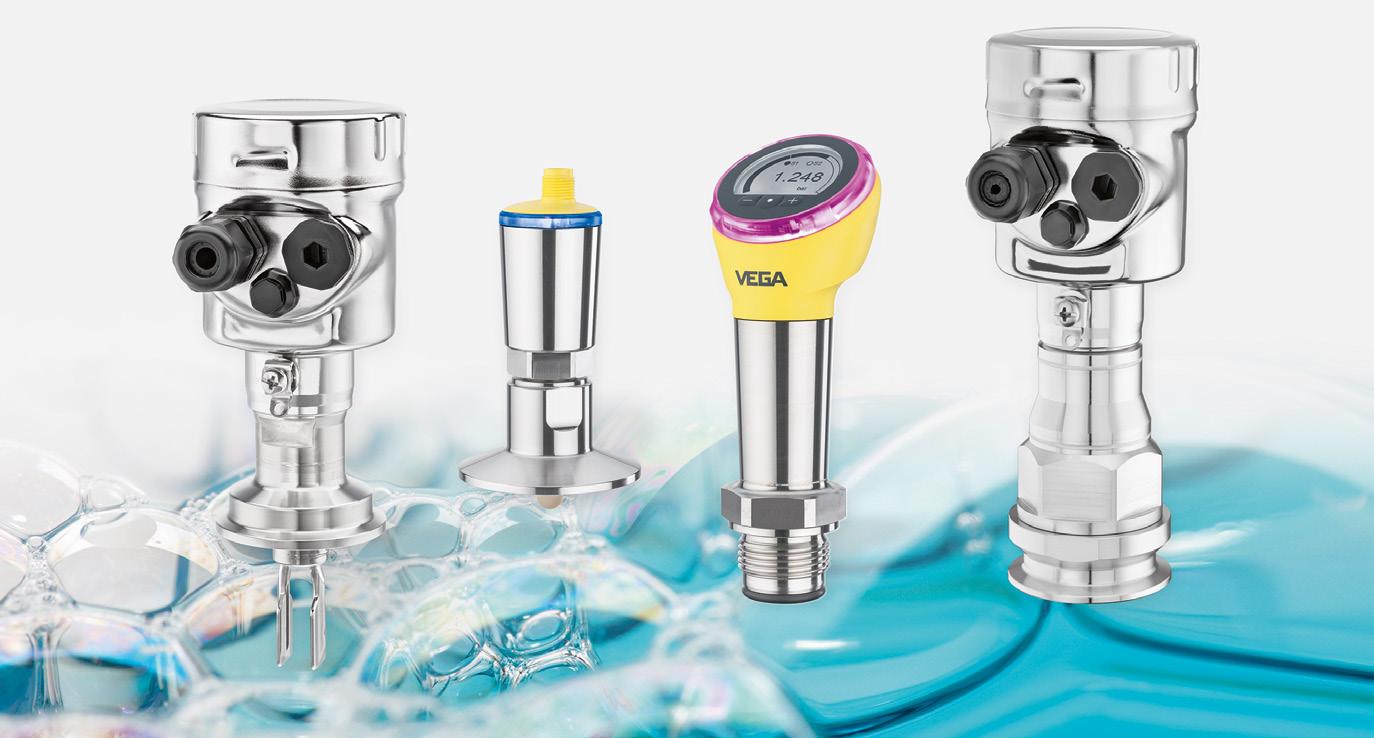
materials, such as stainless steel or ceramic, and they’re designed to withstand high-pressure cleaning, steam sterilisation, and aggressive cleaning agents, ensuring full compliance with industry standards like 3A, EHEDG, and FDA requirements.
One of the biggest challenges in lab-scale food processing is handling diverse and complex ingredients. Whether working with viscous syrups, foaming dairy products or fine powders, precise level measurement is vital to process efficiency and batch integrity. The VEGAPULS 6X radar sensor is a top choice in this regard. It offers non-contact, continuous level measurement, which eliminates the risk of product contamination while ensuring consistent results, even when installed on small tanks or containers. Thanks to its high dynamic range and compact design, the VEGAPULS 6X delivers accurate readings regardless of media type, temperature fluctuations or condensation within the vessel. This reliability makes it ideal for tasks like monitoring raw ingredient levels during mixing, tracking fermenting volumes in probiotic foods or controlling fill levels in dosing containers. Plus, its hygienic housing and easy-to-clean design make it a seamless fit for lab environments where cleanliness and space efficiency matter.
“Laboratory-scale food processing plays a central role in R&D for the food and beverage industry.”
VEGA sensors are more than just hardware; they’re part of a smart, connected ecosystem. With digital communication protocols like IO-Link and Bluetooth, VEGA instrumentation allows operators to access sensor diagnostics, monitor real-time trends and ensure full traceability of every batch. For food manufacturers, this kind of data can be a game-changer. It helps track variations in pressure or level that may affect product texture, taste, or stability. It also supports early identification of process anomalies that could lead to quality defects or equipment damage. In short, it helps teams work smarter, not just harder. One notable solution is the VEGAPOINT series of capacitive point level switches, which are ideal for lab containers or small mixing vessels. The VEGAPOINT 21 and 31 models feature 360° status LEDs that provide immediate, visual feedback on switching states. This makes monitoring easy, even from a distance, which is particularly helpful in busy lab environments with multiple processes running simultaneously.

Vega



Too many cooks spoil the broth. That’s why our level and pressure measurement technology focusses on the essentials: reliability, efficiency and knife-edge precision. With the latest technology, you always get the values you need, wherever you are. So that you can concentrate fully on your personal recipe for success.
Everything is possible. With VEGA






BMG supplies Rollon's hygienic linear motion systems, engineered for meat, poultry, and fish processing lines requiring stringent hygiene and operational reliability.
BMG supplies and supports highspecification linear motion systems from Rollon, which are engineered for high-performance automation in many industries, including food processing, where hygiene, durability and operational continuity are essential.
“Meat, poultry and fish processing lines place unique stresses on automation components, which is why selection of the correct equipment is so critical,” says Leon Koekemoer, BMG’s Linearway & Ball Screw Product Specialist. “Rollon motion guidance systems have been developed in line with stringent industry regulations for global hygiene standards and offer advantages over conventional guides and actuators. Rollon’s advanced sealing technology, corrosion resistance and durable materials ensure extended service life, while reducing the risk of product contamination and mechanical failure. We also recommend the use of FDAcompatible lubricants to further ensure foodsafety compliance.
“Rollon’s MiniRoller Rail and ELM actuator systems provide OEMs and integrators with solutions that endure continuous duty and aggressive sanitation, without compromising motion precision or operational reliability. These robust systems have a sealed design, with corrosion resistance and features for easy cleaning, required for continuous operation in aggressive washdown and contamination-sensitive environments. The Rollon MiniRoller Rail delivers a compact, roller-bearing linear guide system with
"Rollon's advanced sealing technology ensures extended service life whilst reducing contamination risk."
induction-hardened raceways (58–62 HRC) and preload-adjustable stainless-steel rollers. This configuration ensures smooth, quiet travel and minimal backlash under moderate loads. Misalignment tolerance supports installation of less-than-perfect mounting surfaces, while the slider body and rollers are manufactured from Stainless Steel to resist rust and chemical attack. The rail itself is nickel-plated and hardened to withstand mechanical shock and caustic cleaning fluids. The MiniRoller Rail supports loads of up to 720 N per roller (depending on size), with travel speeds up to 1.5 m/s and acceleration rates of up to 50 m/s². This system, which is designed for compact machinery where space and hygiene are critical, is suitable for slicing, deboning, conveying, and robotic picking systems in red meat, poultry and seafood lines.
For linear actuator applications in food processing, specialists recommend the use of the Rollon ELM series, which offers a sealed belt-drive solution with internal recirculating ball guides housed in an extruded aluminium profile. A polyurethane sealing strip shields internal components from high-pressure washdowns and airborne contaminants. To enhance sealing performance, the unit can be positively or negatively pressurised (typically
0.7–0.8 bar). An anti-corrosion version with Stainless Steel components is available for applications with direct fluid exposure or for use in corrosive atmospheres, like brine and blood-rich zones typical of poultry evisceration or fish gutting lines. The ELM actuator supports stroke lengths up to 6 m and loads up to 2,000 N, with travel speeds up to 5 m/s depending on model. This system is engineered to reduce downtime and minimise maintenance in harsh environments by avoiding exposed mechanical components and enabling rapid cleaning cycles. Mounting options and drive configurations can be customised, and integration into multi-axis systems is straightforward due to the profile’s modular compatibility.
The BMG team offers full engineering support, including CAD configuration, integration assistance, product selection and lifecycle optimisation services. Rollon systems are ideally suited for OEMs building hygienic conveyors, portioners, sorters, cutters and handling systems across food protein processing environments. BMG’s Rollon portfolio includes linear guides, telescopic rails, actuators and multi-axis systems, as well as ball screws and rotational units - engineered to function reliably in heavy-duty industrial operations. These robust components withstand high loads, continuous use and exposure to harsh environments, making them suitable for other sectors including automotive assembly, electronics manufacturing, packaging and







To advertise contact us at advertise@b2bcentral.co.za or tel: +27 (0)11 877 6111



Stay ahead of the curve with the latest industry news & insights, or have it delivered to your inbox to read later.
Read digital issues from all our B2B titles on your PC, smart phone or tablet. PDF downloads also available.
Remove geographical barriers and expand on your expertise with knowledge-sharing webinars across a variety of topics.
You can create a free profi le on www.b2bcentral.co.za/register to gain access to all of this and much more.
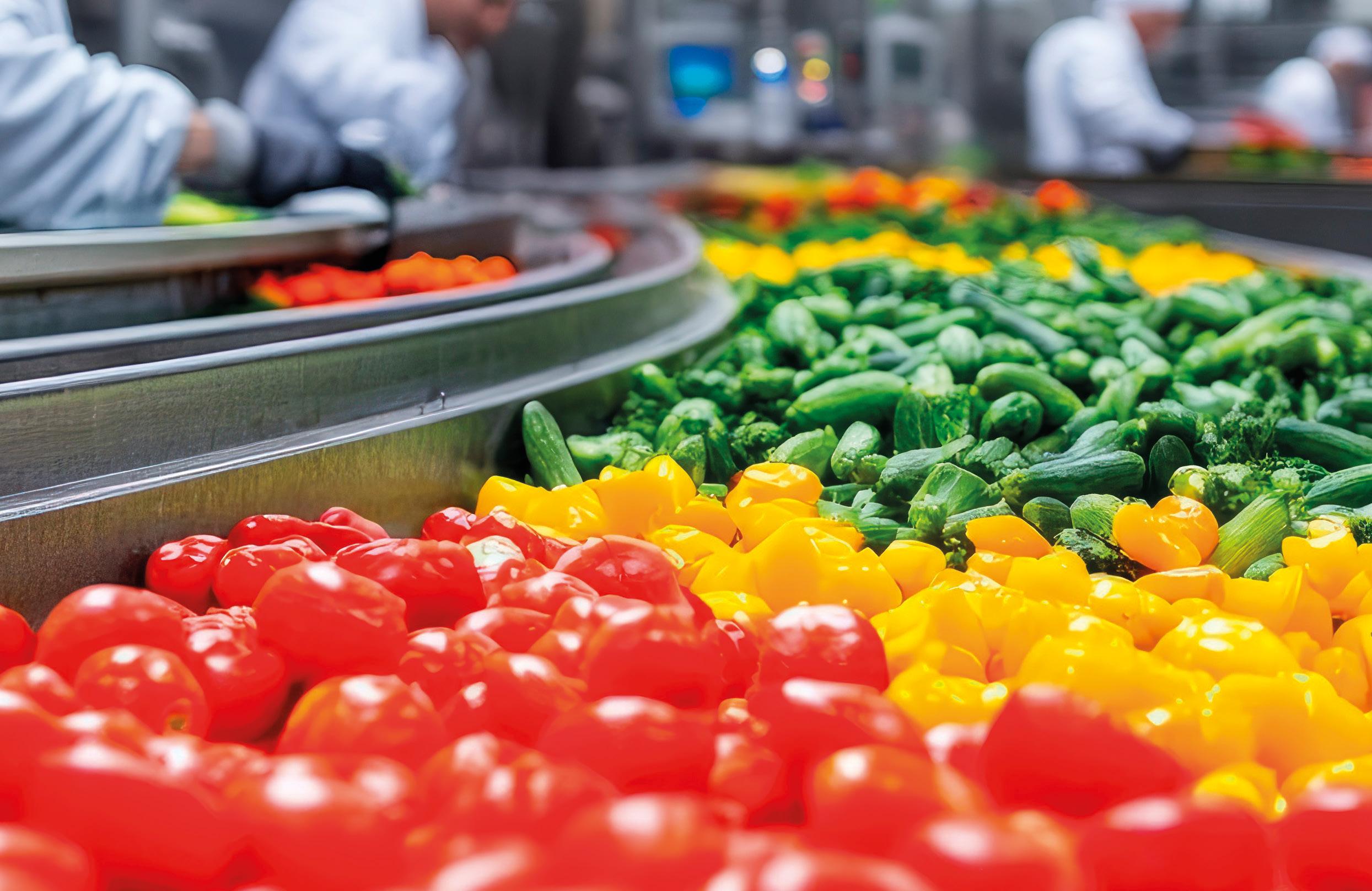



•
•
•
•
•
•